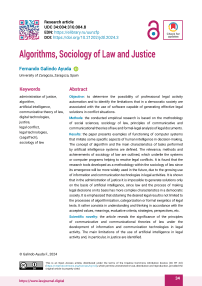Algorithms, Sociology of Law and Justice
Автор: Galindo Ayuda F.
Журнал: Journal of Digital Technologies and Law @lawjournal-digital
Статья в выпуске: 2 (1), 2024 года.
Бесплатный доступ
Objective: to determine the possibility of professional legal activity automation and to identify the limitations that in a democratic society are associated with the use of software capable of generating effective legal solutions in conflict situations. Methods: the conducted empirical research is based on the methodology of social sciences, sociology of law, principles of communicative and communicational theories of law, and formal-legal analysis of legal documents. Results: the paper presents examples of functioning of computer systems that imitate some specific aspects of human intelligence in decision-making. The concept of algorithm and the main characteristics of tasks performed by artificial intelligence systems are defined. The relevance, methods and achievements of sociology of law are outlined, which underlie the systems or computer programs helping to resolve legal conflicts. It is found that the research tools developed as a methodology within the sociology of law since its emergence will be more widely used in the future, due to the growing use of information and communication technologies in legal activities. It is shown that in the administration of justice it is impossible to generate solutions only on the basis of artificial intelligence, since law and the process of making legal decisions on its basis has more complex characteristics in a democratic society. It is emphasized that obtaining the desired legal result is not limited to the processes of algorithmization, categorization or formal exegetics of legal texts. It rather consists in understanding and thinking in accordance with the accepted values, meanings, evaluative criteria, strategies, perspectives, etc. Scientific novelty: the article reveals the significance of the principles of communicative and communicational theories of law under the development of information and communication technologies in legal activity. The main limitations of the use of artificial intelligence in legal activity and, in particular, in justice are identified. Practical significance: the formulated provisions help, while improving legal regulation, to avoid insufficiently justified decisions on the automation of law enforcement, as well as to take into account the increasing importance of the principles of communicative and communicational theories of law in such types of legal activities as creation, interpretation and application of laws.
Administration of justice, algorithm, artificial intelligence, communicative theory of law, digital technologies, justice, legal conflict, legal technologies, (LegalTech), sociology of law
Короткий адрес: https://sciup.org/14129096
IDR: 14129096 | УДК: 34:004:316:004.8 | DOI: 10.21202/jdtl.2024.3


